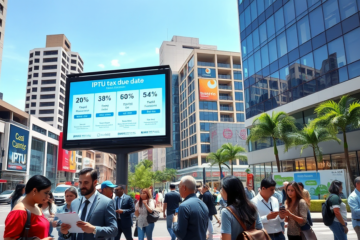Venezuela's 77% Tariffs Affect Business Owners
Venezuela Tariffs have generated concern among Brazilian businesspeople, especially those from the state of Roraima, due to the recent imposition of tariffs of up to 77% on exported products.
This measure, which contradicts an exemption agreement signed in 2014, reflects a moment of tension in relations between Brazil and Venezuela.
The Brazilian government's failure to recognize Nicolás Maduro's reelection contributes to an unfavorable business environment.
In this article, we will analyze the implications of this decision, exports and imports between the two countries, and the Brazilian government's reactions to this new reality.
Venezuelan Tariffs of up to 77% and Violation of the 2014 Agreement
Venezuela's recent decision to impose tariffs of up to 77% about Brazilian products generated great concern among businesspeople in Roraima.
This policy directly contradicts a tariff exemption agreement signed between the countries in 2014. The measure, which occurs amid tense bilateral relations due to Brazil's non-recognition of Nicolás Maduro's election, highlights the gravity of the current situation.
With the termination of the agreement, Brazilian exports, which reached US$1.2 billion in 2024, now face barriers that directly affect competitiveness.
To better understand the context, consider the following factors that aggravate the situation:
- Political disputes between nations, exacerbated by diplomatic disagreements.
- A Venezuelan fiscal need, which seeks to increase revenue through additional tariffs.
- Pressure on logistics chains, affecting exports and access to local markets.
These tensions pose significant challenges to regional trade, requiring constant attention from both governments.
Infomoney addresses additional tariff details.
Brazil–Venezuela Trade Balance in 2024
In 2024, the trade balance between Brazil and Venezuela stood out for relevant positive balance for Brazil.
Brazilian exports to Venezuela reached US$ 1.2 billion, while imports amounted to US$ 422 million.
This performance remains consistent, even in a scenario of sanctions and changes in diplomatic relations.
The tariff measures imposed by Venezuela under an unprecedented tariff of up to 77% impacted several sectors, but Brazil still recorded a considerable surplus.
For more details on the trade balance and other economic data, check out the report at trade balance website.
| Year | Exports (US$) | Imports (US$) | Balance |
|---|---|---|---|
| 2024 | US$ 1.2 billion | US$ 422 million | Surplus |
Impact on Business Owners in Roraima and Other Mercosur Members
The imposition of tariffs of up to 77% on Brazilian products by Venezuela directly impacts businesspeople in Roraima, who face increased costs and difficulties in concluding commercial contracts Learn more about this tax here.
These tariffs also affect other Mercosur member countries, reducing the competitiveness of Brazilian products in the Venezuelan market.
A businessman from Roraima confided that “with these exorbitant taxes, our products lose ground to competitors from other countries that do not face the same barriers.”
This panorama compromises not only the local economy, but also regional integration efforts, causing losses significant for all involved.
Actions like these highlight the complexity of trade relations in South America at a time of diplomatic tensions.
The Brazilian government is in dialogue with Venezuela in search of solutions to mitigate these impacts.
Learn more about the impacts here
Political Context and Brazilian Government Response
Following the Brazilian government's decision not to recognize Maduro's reelection, relations between Brazil and Venezuela are at a delicate stage.
This choice generated tensions that contributed to the imposition of tariffs by Venezuela, surprising Brazil's export sector.
According to the Folha BV website, Venezuela implemented this measure in violation of previous agreements, economically harming states such as Roraima.
In this scenario, Itamaraty informed that is monitoring the situation closely, seeking to clarify the motivations behind the tariffs and trying to establish a dialogue with Venezuelan authorities.
This position signals Brazil's commitment to mitigating negative impacts on national businesspeople and maintaining the stability of Mercosur as an effective economic bloc, even in the face of adversities such as the announced surcharges and diplomatic tensions between the countries.
US 50% Surcharge and Simultaneous Pressures on Brazil
The recent imposition of tariffs by Venezuela, reaching up to 77%, occurs simultaneously with the American surcharge of 50% about Brazilian products.
This synergy of tariff pressures creates a significant burden on Brazil's exports, resulting in economic challenges for key sectors.
Tensions in trade relations between the countries stand out, while businesspeople and producers face uncertainty.
In relation to the most affected products, a considerable impact is observed, as already evidenced in US surcharge.
Therefore, the main affected products include:
- Orange juice
- Coffee
- Meat
- Thefts
.
The expected economic impact ranges from the reduction in investments until increase in export costs, potentially reducing Brazil's competitiveness in the international market.
Diplomatic negotiations become imperative in this scenario, seeking to ease trade barriers and avoid the worsening of bilateral relations with Venezuela and the United States.
Venezuela's tariffs pose significant challenges to bilateral trade, affecting not only Brazilian businesspeople but also the dynamics of Mercosur.
The Brazilian government continues to seek solutions and clarify the situation with Venezuelan authorities, while keeping a close eye on international reactions.



0 Comments